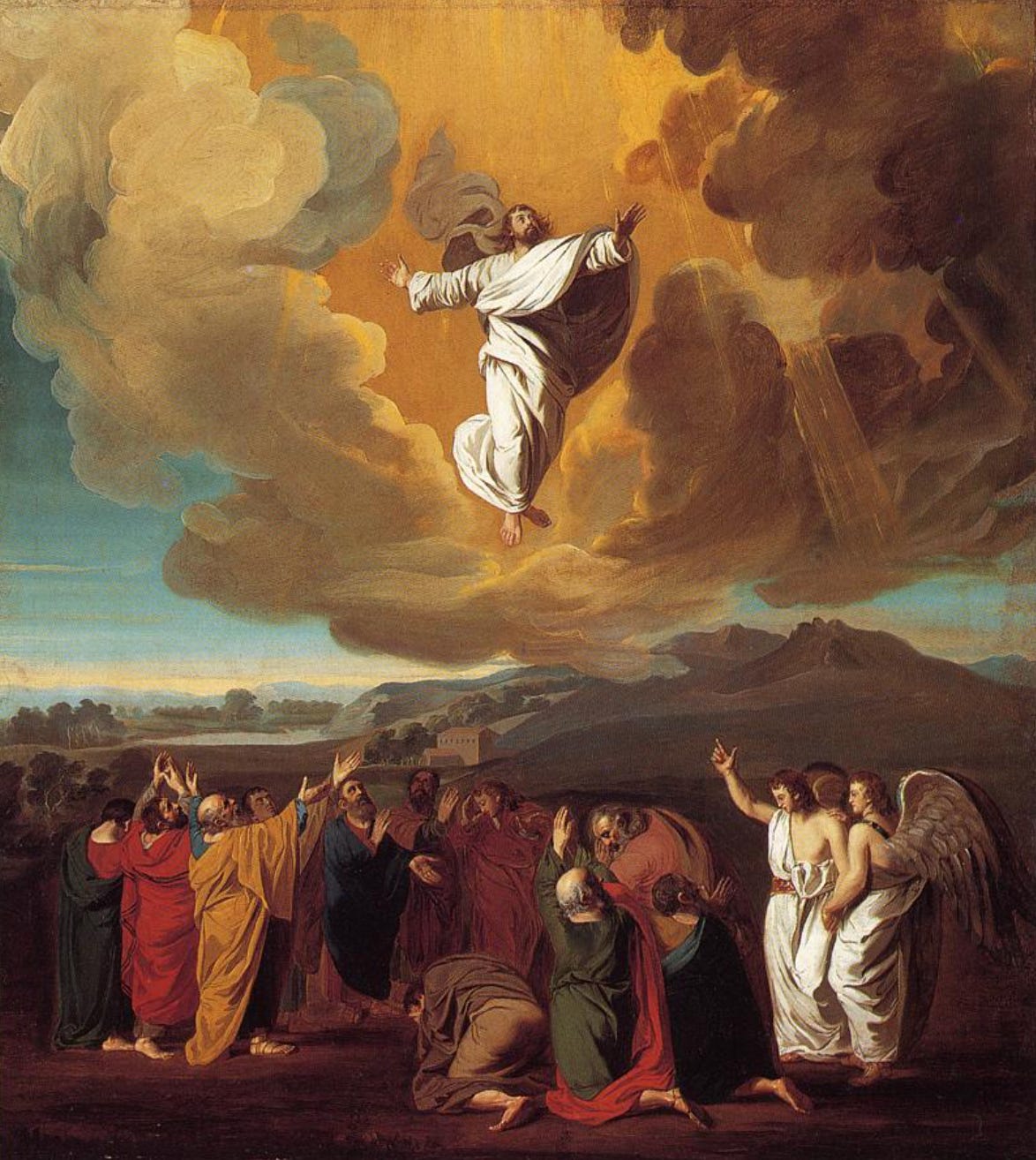Luke 24:45-53 (NRSVUE)
Then he opened their minds to understand the scriptures, and he said to them, “Thus it is written, that the Messiah is to suffer and to rise from the dead on the third day and that repentance and forgiveness of sins is to be proclaimed in his name to all nations, beginning from Jerusalem. You are witnesses of these things. And see, I am sending upon you what my Father promised, so stay here in the city until you have been clothed with power from on high.”
Then he led them out as far as Bethany, and, lifting up his hands, he blessed them. While he was blessing them, he withdrew from them and was carried up into heaven. And they worshiped him and returned to Jerusalem with great joy, and they were continually in the temple blessing God.
This past Thursday the Church marked Ascension Day which we now celebrate here together today. The Ascension of Jesus Christ is what we at GA see visually every time we come together for worship. Behind the altar is a beautiful painting of Jesus ascending into heaven with the disciples below him. We see Jesus literally in the air above the disciples ascending to heaven. It is both a beautiful image, and one that in 2025 leaves many people questioning how we can believe that Jesus flew up into the air into a heavenly realm above the earth which we know is filled with planets, and black holes, and that rockets ascend into.
So what does the ascension mean to us in 2025? In answering that, there are really two questions to address— 1) How do we make sense of Jesus ascending into heaven? And 2) why does it matter to us?
First of all, how do we make sense of Jesus ascending into heaven? Here it is important to put the Biblical picture of heaven and earth into play. Heaven is not the space above earth, but rather, heaven is another dimension of reality which both overlaps with and yet is distinct from the dimension in which we live our day to day life. In the incarnation, Jesus Christ, God in the flesh, came into our earthly dimension. It is in the ascension that the incarnation is made complete in that God in flesh who has lived a human life passes just beyond the veil into the heavenly dimension. He did not float off into space, but rather the incarnate one, God in flesh, moves into the heavenly dimension not just as a spirit but with a human body. Which brings us to our second question— why does the ascension matter to us?
To say that God is Love and that you are loved by God doesn’t mean that God whispers down from a far away heaven “I love you, hope all is good down there,” to say that God is Love means that God takes on human flesh and brings the human experience, all of the human experience, into what it means for God to be God. That is why the Acsencsion is Good News for you. The incarnation, God taking on flesh, is only complete with the ascension. Jesus takes all of what it is to experience being a human— the joy, the anxiety, the longing, the connection, the beauty, the annoyances, the frustration, the failures, the desires, all of it— into what it means for God to be God. Even including the depth of the pain of humanity— in going all the way to the cross and experiencing the reality of injustice and suffering, and then rising again with scars and ascending to the heavenly dimension with those scars. All of the fullness of the human experience is not only seen by God but has been brought into what it means for God to be God. The fullness of your human experience, the highs and the lows, the fullness of the human experience of those around you, and even that of those on the other side of the world, are part of who God is and what God experiences. God is not the distant creator, God is the creator who entered the story of creation and incorporated creation into the creator. Not in an abstract way, but in a deeply personal way, in Jesus Christ.
The ascension means not that Jesus has floated up above the clouds and has abandoned us, but rather that even though we cannot see him with our eyes in the earthly dimension, he is ever present to us in and through the heavenly dimension of reality. As Dietrich Bonhoeffer said in an Ascension Day Sermon in 1933, “He is close to us in his church, in his Word, in his sacrament, in the love among brothers and sisters. Here he comforts us who are abandoned; here he soothes our homesickness ever anew; here he takes us who are estranged from God, who are in barren, empty places, who don’t know the way, who are alone, and makes us joyful in his Christly presence. Joy in the sermon, joy in the sacraments, joy in brothers and sisters—that is the joy of the believing church in its unseen, heavenly Lord.”1
Ascension Day is of great joy as we celebrate that we do not go through this life abandoned by our creator, but rather with a God who is closer to us than our own breath, who loves us not from afar but by sharing with us in what it is to be human, and who meets us in the midst of our human experience. When you look up in the sanctuary here at GA and see that beautiful painting behind the altar, remember that God is with you as one who knows and experiences all of what you experience in being a human. You are never abandoned, and you are loved more than you can imagine.
Amen.
Dietrich Bonhoeffer, The Collected Sermons of Dietrich Bonhoeffer, p. 77



